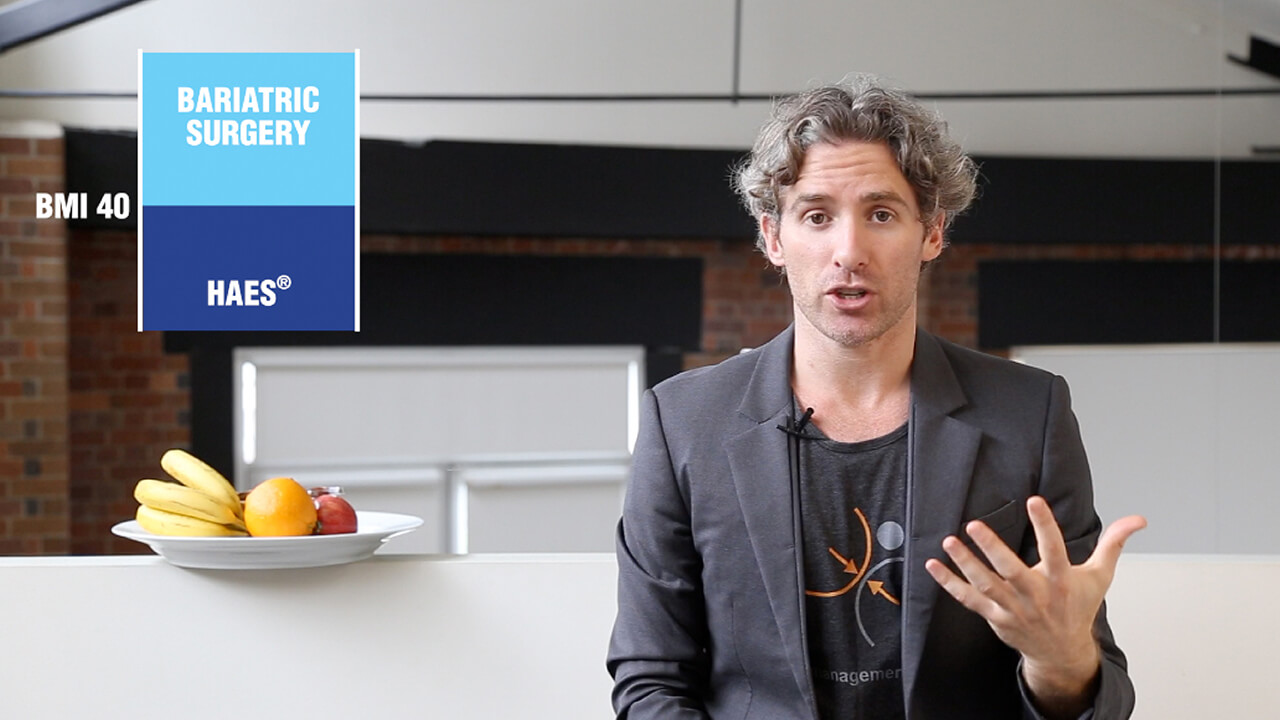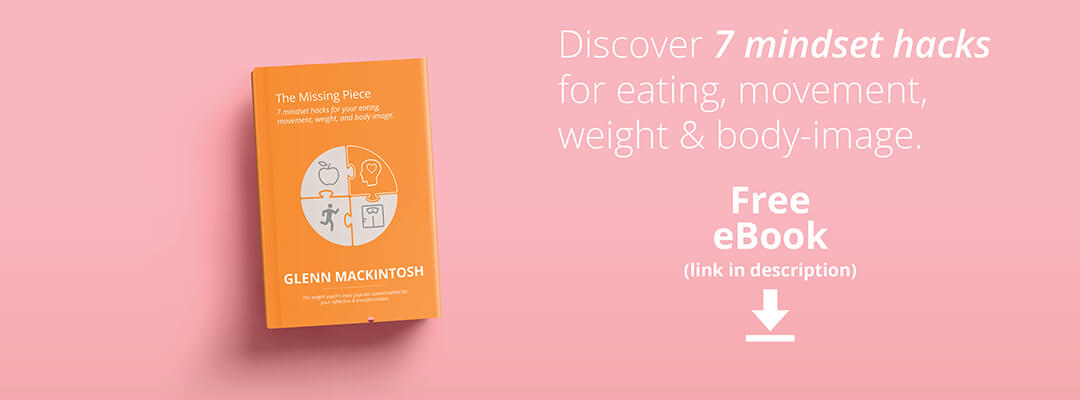
Choosing the approach you take to improving your eating, exercise, weight, and health is confusing! And this confusion isn’t helped by the great marketing techniques for weight loss programs that research tells us just don’t work. Two approaches that have some research behind them are Health At Every Size® (HAES®) and Bariatric Surgery, but they seem to be ideologically opposed and both can claim to be the only answer…so which one is right for you?
In this Thursday Therapy Glenn answers what may be the most burning question in the psychology of weight management at the moment…HAES ® or Weight Loss Surgery?
Watch Video
I created this video for people just like you.
If you found it valuable, please help me share it with them!
LINKS FROM VIDEO:
Facebook Support Group http://bit.ly/1S7Wgnk
Health At Every Size Info http://bit.ly/2zwBde2
Thursday Therapy on Bariatric Surgery http://bit.ly/2zi3hRe
Measure Your BMI http://bit.ly/2yuayya
SHOW NOTES
- Viewer question on Health At Every Size® and Bariatric Surgery. [1:23]
- On the confusion people feel with different approaches. [3:31]
- What is right for ‘me’. [4:12]
- How Health At Every Size ® started and the ‘contemporary’ Health At Every Size®. [4:33]
- Research on Health At Every Size®. [6:03]
- On Bariatric Surgery. [7:18]
- Research on Bariatric Surgery. [7:50]
- Research on Bariatric Surgery & HAES vs Dieting. [9:29]
- How do I find out what’s best for me? [10:24]
- How do I decide and factors to consider. [13:54]
- A post from a member of our Facebook Group on making the decision for yourself. [15:49]
TRANSCRIPT
Hello everyone. Welcome to Thursday Therapy. I’m Glenn Mackintosh, The Weight Psych, and today we’re answering an often thought of but rarely asked question about people who really like Health At Every Size® principles, but are also considering bariatric surgery. Welcome to Thursday Therapy where I answer your questions on the psychology of eating, movement, weight, and body image every two weeks.
I hope you’re doing well. We’re doing really, really well, and thanks to you we’ve hit a big milestone, 5,000 subscribers on our email newsletter, as well as going out to our YouTube and our Facebook communities. We share a really special relationship with you guys, so thank you so much and that’s really cool for us. Let’s get to answering our question, a really, really topical question. In fact, I think probably the most asked question, even if people don’t ask it out loud, in this whole space at the moment.
The question comes from Cathy, “Hi, Glenn, this is something I’ve been struggling with for quite some time, and I would like to hear your thoughts and others on this. As a mum of two girls I am loving the Health At Every Size® movement. This is something I actively speak to the girls about. However, here is my dilemma. I’m extremely overweight in a not healthy way. I am considering gastric surgery, but continually get caught between feeling almost idealist and waving my HAES® flag, and then the reality of my body slowly falling apart. How does one process each of these almost opposing thoughts?
“I am moving, eating better, and thinking better since doing your programme, but the numbers, blood tests, and weight are not moving. I don’t want anyone thinking I’m caught up in the numbers, but the reality is they are not good. The polarising arguments in my head are exhausting.” Cathy, this is a great question. Guys, Cathy put this to our Facebook support group, and the comments were amazing. Karen said, “You’re not alone. This is a very real struggle for me.”
Jodie said, “Great question, Cathy. I’m struggling with this too.” Similarly, Melissa said, “What a great question. How brave of you to share.” If you want to go and have a look at that post, we might pin that post for a couple of weeks so you can have a read through. The comments on it are actually really good too. There’s some health professionals and some people that are speaking from personal experience, and they share some really, really great info.
The first thing that I want to say to you is that it’s natural to be confused. The Health At Every Size movement is a relatively new approach, at least in the public space. You’re likely to get a whole bunch of different health professionals and some of them fairly adamant telling you a bunch of different things about what you should and shouldn’t do. Naturally that’s confusing. I don’t want you to feel guilty for being confused.
I actually feel like part of that is our problem as health professionals. We sometimes fall into conversations that are a little bit dogmatic, and sometimes a bit polarising and adversarial. I think we need to do a better job to have some more evidence-based and rational and open discussions to reduce your confusion. I think for all of us, we need to almost see this confusion as a natural stage we’re going to go through in the way to finding the answers that work for us.
Guys, what we’re going to do is we’re going to have a little talk about Health At Every Size, because there’s a lot of people who are not quite sure what that really is and isn’t. Then we’re going to have a talk about bariatric surgery, and then we will get to helping you in starting that process of figuring out what might work best for you as a unique individual.
Health At Every Size advocates believe that the health/weight relationship is grossly exaggerated. There are a lot of people out there who think they need to lose weight who actually don’t, but that even if you could benefit medically from losing weight it’s not going to help you to focus on it, because one of the fundamental assumptions of Health At Every Size is that all weight loss approaches are either ineffective or potentially harmful.
I was speaking to Deb Burgard who is the founder of the Health At Every Size movement, and she said, “Glenn, Health At Every Size really started over 30 years ago as a professional-driven grassroots movement by health professionals who were just sick and tired of being told that they had to tell their clients to lose weight, and providing ineffective treatments that weren’t working for people.”
What Health At Every Size has become and the way we think of it now is the type of Health At Every Size that’s popularised by people like Linda Bacon, where it’s not only about taking the focus off weight, but also about learning intuitive eating skills, self-care skills, learning how to enjoy physical movement. It’s basically taking great care of yourself but from a weight-neutral perspective, learning how to take care of yourself without the weight focus.
Research shows that into the medium term Health At Every Size approaches actually work better than conventional diet and exercise approaches. Now, this is for people in a BMI of 30 to 40, so these are people who would generally think of themselves as overweight. What this research showed that they could improve their psychological health, but also their physical and metabolic health just by focusing on their overall health and removing the focus from weight loss.
Now, in this treatment the people actually didn’t lose weight, which is really interesting. People think, “Well, if they’re eating better and they’re moving more, why aren’t they losing weight?” Well, naturally the body likes to gain weight more quickly and more easily than it does like to lose weight, but it shows us something really important that health behaviours without requiring weight loss are really important for your physical and mental health. It also shows us that maybe weight loss is not the gatekeeper to health and happiness.
I won’t go into a lot of detail about bariatric surgery, because we’ve already done a great video on it. In fact, it was our most popular video to date, which is really interesting because we work generally in a non-dieting space, but it was very interesting for us to see how many of our people were interested in bariatric surgery. If you haven’t already, definitely check that out. We even provide links in there to where you can further go and explore bariatric surgery for yourself.
Research shows that up to the 10 to 15 year mark, so long-term research, that bariatric surgery also works better than dieting in people with a BMI of 40 and above. Now, there are a lot of people who do bariatric surgery at BMIs of lower, and also people who do it who don’t necessarily have any health complications at all, which I don’t think is the right reason to do bariatric surgery. I believe that bariatric surgery is best done when it’s medically indicated.
I think there’s a lot of people who do it for body image reasons, and I don’t necessarily think that that’s the right reason, because research shows that you can actually improve your body image by thinking differently about your body. We’re at week two of our Love Your Body Healthy programme, which is just an online programme for body image. People are already boosting their body image, and we’re not focusing on weight loss at all.
For people in the BMI of 40 and above there is significant research to show that bariatric surgery works better than dieting. One thing you need to know is that it’s not a silver bullet. I was recently chairing a keynote presentation by Christine Morgan who is the CEO of The Butterfly Foundation. She very aptly described bariatric surgery as a pay to play treatment. By that she meant that there are significant benefits to be gained, but also some very real potential downsides. You very much need to consider those.
What we see so far is that Health At Every Size and bariatric surgery both work better than weight loss dieting. I think that’s the most important point that you need to start off with. A lot of empowerment comes from letting go of an approach that doesn’t work. The research shows us that 97% of people who do a normal diet and exercise programme will regain the weight with interest and end up feeling worse about themselves. While pretty much every diet is sold to you like it’s something different, there’s no research to show that it is.
While all diets claim that they work, none of them really do. I think there is a lot of power in what we don’t do. That’s where we can start off with. What we have is some research that shows us that up to a BMI of 40 people can get great benefit from a Health At Every Size approach, although there are a lot of people who’ve BMI above 40 who say they find a real benefit in that approach as well.
We also see that from that BMI of 40-plus, there are great benefits that can be gained from bariatric surgery approach, although there are a lot of people below that BMI of 40 who also do bariatric surgery. We do have some evidence that in that BMI of 35 to 40 for people who have comorbidities, so health problems that are related to their weight, they can also do really, really well with surgery. The reality is above that BMI of 40 can Health At Every Size work well? We don’t really know, although a lot of people say and feel like it works well for them.
What we really need to find that out is a controlled trial. I’d love to see a controlled trial, say, BMI of 35 to 50 where we could randomise people into a Health At Every Size or a bariatric surgery group. Those studies have been done versus dieting, so it is something that’s possible. Until we do that and we find out more information, how do you make the choice that’s right for you?
The first thing that I want you to know, and you kind of already know this but I want you to know it deep down is that it’s your choice. If you decide to follow a Health At Every Size approach, that’s your call, even if your medical health professional thinks you’re barking mad. If you decide that bariatric surgery is the right thing for you, that’s your decision even if you don’t feel like you’re flying the Health At Every Size flag by doing that. It is your call.
There are a lot of people advocating for some really positive social change, but my job as a psychologist with my clients and my job with you is to help you make the decision that practically works for you as a unique individual. This is what we do in the 12-Month Transformation programme. We spend the first session talking about all of this stuff and helping people set the goals that are right for them. About half of the people in that programme they end up setting no weight goals at all.
The whole TMT essentially becomes a Health At Every Size approach. They’re sitting in the same room as the other half of people who are maybe going to focus on a small weight loss, or going to focus on bariatric surgery and getting a significant weight loss. It all practically works. We don’t follow an ideology. We don’t follow principles. Our principle is to focus on the person and help figure out what works for them.
We do always need to be mindful that we have a natural, inherent weight bias in us, so we are definitely going to naturally think that we have to lose weight even if we don’t. We really have to take a step back, look at all the factors, and figure out what works for you as a unique individual.
How do you make the choice that’s right for you? I feel like medical health is the best indicator, and I can’t believe I’m saying this, but I think here is one area where the BMI works quite well. If you’re a BMI of up to 40, we would probably favour a Health At Every Size approach. If you’re a BMI of 40 and above, we might favour a bariatric surgery approach, although still, of course, with the psychological support and even non-dieting principles.
If you’re in that BMI of 35 to 40 with comorbidities then it’s really a matter of your choice. Either will tend to work for you. What medical problems should we consider? Well, definitely the metabolic health issues, so things like your blood pressure, your cholesterol, your blood sugar levels, and they can be something that you look at with a blood test. Also, health-related quality of life, so things like your mobility and your pain and your sleep.
It’s always important to remember though that even if an issue is related to your weight, sometimes you can tackle those issues directly. For example, you could tackle sleep issues by getting a CPAP machine or a sleep study done. You can tackle joint issues by getting physiotherapy and doing exercises. Even if something is related to your weight, it doesn’t always mean that weight loss is the answer.
The reality is, Cathy, that you don’t have to make a decision based on being in one camp or the other. Thank goodness we can take what works for us out of all of the available approaches and we can leave that which doesn’t help us. Gabby, I think, from our Facebook group, and, Gabby, thank you, you’ve been doing some wonderful things in the group and some lovely comments, summed it up pretty well by saying, “The beauty about HAES is it’s a human made theory or style of practise, and that means you can adopt the bits you like and ignore the parts that you don’t.”
Our video on bariatric surgery also echoed those sentiments, that while sometimes ideologically they might be opposed, practically they can work really, really well together. The bottom line is it’s your life, it’s your health, it’s your choice. Be aware of your natural bias to want to lose weight. Really review the evidence. See how that evidence applies to you and you will find the right answer that’s just the way forward for you as a unique individual.
Guys, this has been a great Thursday Therapy. Wonderful question, and I’d love to hear your comments, because we really do learn from each other. If you like the video, let us know, and this could be a great one to share with someone who’s grappling with this issue, or a Health At Every Size advocate to see what they think, or a bariatric surgery team. I think it’s really important that we have great, open, respectful discussions. Happy thinking. Good luck on the next step to giving your feelings time to confirm themselves, and I’ll see you at next Thursday Therapy.





